The US, South Korea and Japan earlier announced that they had agreed to step up pressure on North Korea.
"The source of pressure that the US, Japan and South Korea are talking about tends to focus on economic measures. And economic sanctions, whether it's done by the United Nations in general or by individual states depends upon the participation and enforcement by China, also Russia to a certain extent," said Smith, the author of the new book "North Korea: Markets and Military Rule".
The importance of China's decision can be explained with its long 1500 km land border with North Korea, which influences the country's trade. In practice, this means that the US, Japan and South Korea would seek China's consent to focus on tightening up the enforcement of UN resolutions, and expanding the limits of its own sanctions towards North Korea, smith said.
"That will be very difficult because China is trying to have a balance between trying to dissuade North Korea from developing its nuclear arms and at the same time trying to offer ways in which communication can take place so that there can be a diplomatic resolution to the security crisis on the Korean peninsula" she explained.
Since China's overall strategic view is "shaped by its economic imperatives", Beijing is adamantly opposed to the North Korean development of nuclear weapons, and seeks political solutions to the conflict.
"[China] gets equally irritated with North Korea and [its] adversaries because it sees both sides as often equally belligerent in terms of their approach to security issues and to refusing to negotiate in the constructive manner." Smith said. "So China is, in a way, in the middle, as Russia has been on some occasions as well."
The foreign ministers of the US, South Korea and Japan decided not to accept the proposals for further negotiations as long as Pyongyang fails to show commitment to denuclearization, the Japanese media reported. The parties also called on North Korea to refrain from any provocative actions and to strictly comply with the UN Security Council resolutions.



